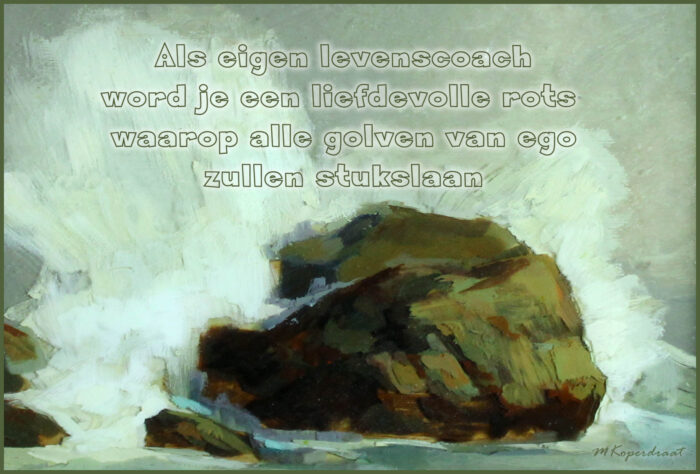Almost everyone is ‘going set’ at some point
The expression ‘going set’ (In Dutch: ‘nat gaan’), originally from the game of Klaverjas (a kind of Belote), means ‘losing by overplaying your hand’. I have another interpretation for ‘going set’: losing oneself when there’s pushback on your beliefs, ideas, or feelings, thus on your perception of the world.
When leading consciousness workgroups, I’m quite assertive. I rely on concise, age-old principles meant to spiritually awaken. Some participants sometimes can’t handle this, it seems. They usually also think they’re already awake, while these principles show this is impossible, which is also demonstrated by someone’s participation in such a consciousness workgroup. Sometimes, people quietly get annoyed by these assertive principles (or by me as the proclaimer) or, after some ‘modest hesitation’, they go on the defensive. But in consciousness workgroups, there’s obviously nothing to get irritated about or defend since it’s about contemplative listening, asking each other questions, and sharing arguments. In short: it’s about learning.
Consciousness work begins with self-analysis. Annoyance arises from identification with one’s perception, with one’s mindset that is seen in a new and apparently unwanted light. This creates feelings or thoughts of opposition. Observing the sensitivities of participants (hearts are vulnerable, toes are long, and fuses are short), I see that it apparently can’t be helped that most people initially get upset, because it happens over and over. I can handle this; I’d have to quit my consciousness work if I couldn’t take criticism. I learn from it, sure, but especially those who, in any way, start feeling uncomfortable due to my approach can learn something. It’s essential to first realize that any emerging feeling of discomfort indicates inner work and that negative feelings are a blessing for those wanting inner liberation. Negative feelings are like red flags in the quicksand of identification, warning: ‘Hold on, stop! Start inner inquiry.’ Once one understands their irritation, criticism stops, and when criticism stops, a profound and also critical exchange begins about how we can develop our consciousness into a permanently awake state.
It’s my impression that almost nobody is well-informed about what’s liberating when struggling with circumstances. Especially when one has been ‘damaged’ by previous life events, one’s inner self can easily get overwhelmed by the slightest trigger. What’s striking is that the more burdened someone is, the less interest they seem to want to show for permanent liberation from mental baggage. Keeping out genuinely healing information (from whatever idea or ‘feeling’) is like blocking out sunlight while sitting in the dark.
When people become defensive due to my information, sometimes this mechanism plays a role: “I’ve been working on myself for a long time, I’ve gone really deep, so don’t tell me I don’t know this already”. What they actually mean is: “Please don’t tell me I’ve overlooked the most important thing, please don’t tell me my problems didn’t need to last this long, please don’t tell me my pain (insecurity, stress, anger, sorrow) could’ve been resolved sooner.” In return, they become resistant, making consciousness research impossible. From this unconscious drive comes another, more annoying identification: “Because of all my struggles (and therapies and courses), I’ve come very far in my consciousness development.” This idea is sometimes fueled by thinking that a high sensitivity to external triggers indicates a high level of consciousness. However, this presumed high sensitivity is more a high ‘sensitivity’ to everything one can’t handle or doesn’t like. It points to an unstable self-image that can be easily hurt, maintained through identification and projection, and shields true inner divine power. Living powerfully from unconditional love, which many claim to pursue, then becomes impossible.
Information about true Being-Conscious – especially if it causes resistance – sheds new light on suffering, difficulties, frustrations, ambivalent reactions to circumstances, and projecting discontent onto others. In short, it shines a light on one’s own inner ‘workspace’ for liberation. Crucial information about Being-Conscious is missing in all sectors in the Netherlands, in education and teaching, in therapies, and even in so-called consciousness podcasts.
Many people don’t actually want to be informed and close themselves off to a consciousness process, allowing their ‘ego bubble’ to remain or even grow. Such a destabilizing ‘ego bubble’ makes you ‘slip up’ at moments when you least expect it. You lose yourself. As a result, you can’t live up to and thus can’t express essential self-imposed core values. ‘Slipping up’ is sad and pointless because it blocks true spiritual potential. That’s why it’s necessary to keep throwing consciousness information, like stones in murky psyche water. If one were to embrace practical self-inquiry instead of rejecting it, it would turn out liberating. A boost of liberating information inspires exercises that empower and enlighten. Very delightful!
 Being aware of your psychological baggage and how to transcend it is the beginning of self-knowledge. Inner work is highly satisfying when you genuinely commit to it as your own life coach! We need to jointly find the shutters that block out sunlight and bravely open them. Being open to someone who knows where these shutters are and how to unlock them isn’t wrong! On the contrary, to achieve a robust inner anchor, it’s a sheer necessity.
Being aware of your psychological baggage and how to transcend it is the beginning of self-knowledge. Inner work is highly satisfying when you genuinely commit to it as your own life coach! We need to jointly find the shutters that block out sunlight and bravely open them. Being open to someone who knows where these shutters are and how to unlock them isn’t wrong! On the contrary, to achieve a robust inner anchor, it’s a sheer necessity.

